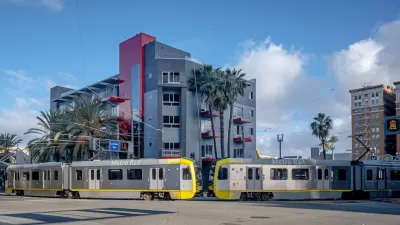Thanks to parking reforms at the state level, Oregon cities are rapidly eliminating parking requirements, paving the way for more affordable housing construction and higher density.

Minimum parking requirements are quietly being eliminated in cities across Oregon, writes Catie Gould for the Sightline Institute.
Normally, parking is one of the most contentious issues for local governments. Any relaxation of parking mandates—rules that prescribe a certain minimum number of parking spaces for any new home or business—is a political hot potato. But new state parking rules have taken that status quo off the table and turned what could be a big debate into a boring compliance exercise.
Cities that want to retain parking minimums under the new state law would have to comply with a complex series of regulations, making the choice to eliminate parking mandates an easy one for many communities. “Now over a million Oregonians live in communities where parking is fully voluntary. More cities are poised to join them the next year, after using a deadline extension granted by the state.”
The domino effect is aided by another law passed in early 2022 that removed parking mandates on developments near transit corridors and stations, which, in some cities, cover the majority of lots. Fully eliminating parking minimums also means cities don’t need to adjust requirements when transit service changes, making it easier for property owners to build ADUs and other ‘missing middle housing’ that is often made too costly by the addition of parking.
FULL STORY: PARKING MANDATES ARE VANISHING ACROSS OREGON

Planetizen Federal Action Tracker
A weekly monitor of how Trump’s orders and actions are impacting planners and planning in America.

San Francisco's School District Spent $105M To Build Affordable Housing for Teachers — And That's Just the Beginning
SFUSD joins a growing list of school districts using their land holdings to address housing affordability challenges faced by their own employees.

The Tiny, Adorable $7,000 Car Turning Japan Onto EVs
The single seat Mibot charges from a regular plug as quickly as an iPad, and is about half the price of an average EV.

With Protected Lanes, 460% More People Commute by Bike
For those needing more ammo, more data proving what we already knew is here.

In More Metros Than You’d Think, Suburbs are Now More Expensive Than the City
If you're moving to the burbs to save on square footage, data shows you should think again.

The States Losing Rural Delivery Rooms at an Alarming Pace
In some states, as few as 9% of rural hospitals still deliver babies. As a result, rising pre-term births, no adequate pre-term care and "harrowing" close calls are a growing reality.
Urban Design for Planners 1: Software Tools
This six-course series explores essential urban design concepts using open source software and equips planners with the tools they need to participate fully in the urban design process.
Planning for Universal Design
Learn the tools for implementing Universal Design in planning regulations.
Smith Gee Studio
City of Charlotte
City of Camden Redevelopment Agency
City of Astoria
Transportation Research & Education Center (TREC) at Portland State University
US High Speed Rail Association
City of Camden Redevelopment Agency
Municipality of Princeton (NJ)





























